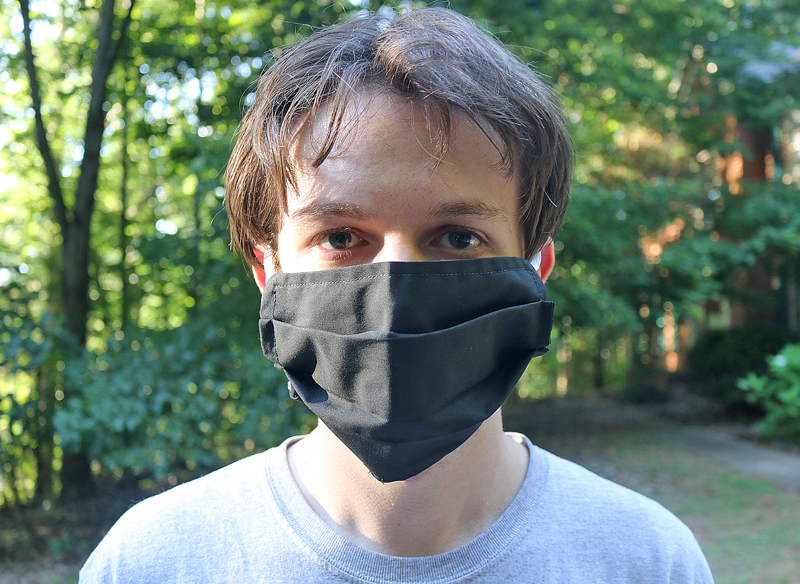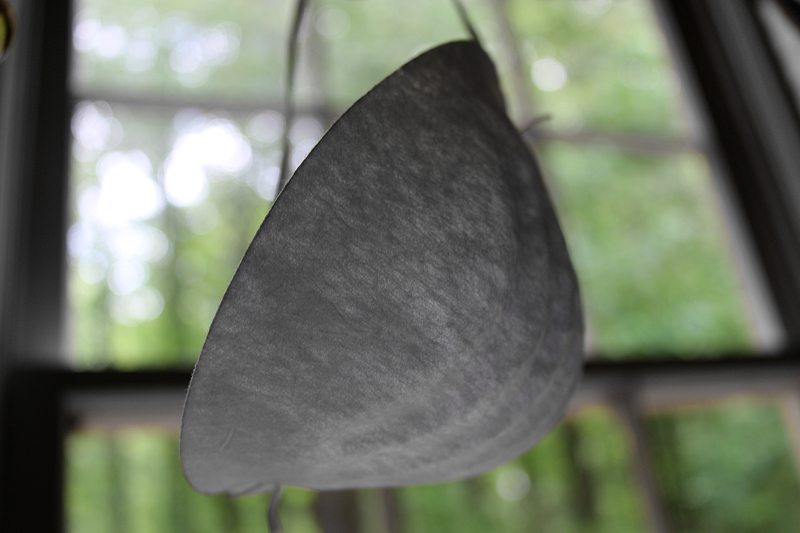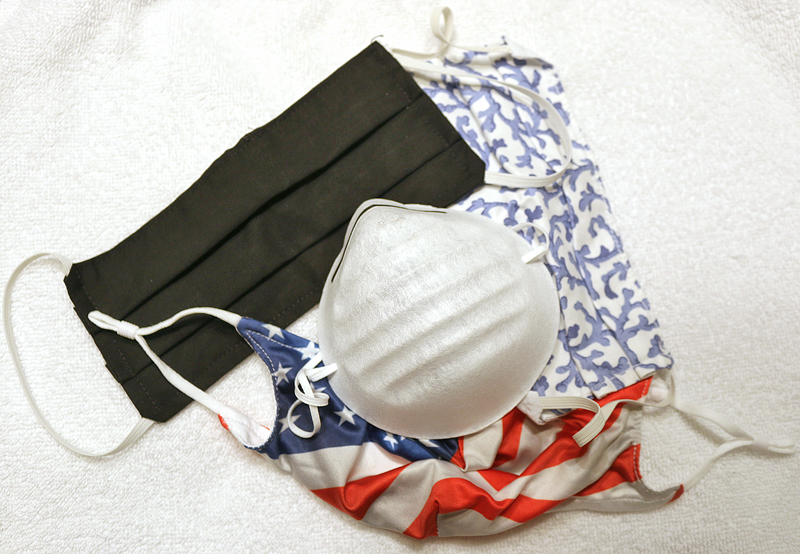Passengers have engaged vociferously in numerous debates over the years — including those of who gets to control the window shade, who gets the space in overhead storage bins, armrests, emotional support animals, people with allergies, crying babies, obese passengers, swapping seats, and reclining seats in the economy class cabin aboard an airplane…
The Debate Over Wearing Masks
…and the latest debate pertaining to masks — or cloth coverings for the face — has quickly permeated throughout the United States well beyond the interiors of airplanes, which contain only so much room. Many airlines now require passengers to wear masks while aboard airplanes because of the 2019 Novel Coronavirus pandemic; and passengers who do not comply with that requirement face penalties — including being denied permission to board the airplane at all.
In recent days, many companies and private establishments have also instituted the requirement to wear masks within their facilities in order to mitigate the spread of the 2019 Novel Coronavirus pandemic. The leaders of governments — such as the city of Atlanta — have issued executive orders requiring the use of masks or cloth coverings for the face within city limits, which includes the international airport.
Both the World Health Organization and the Centers for Disease Control and Prevention initially advised against wearing face masks in response to the 2019 Novel Coronavirus pandemic, as they were deemed not necessary in order to stay healthy…

…but then on Friday, April 3, 2020, the Centers for Disease Control and Prevention issued an advisory with the recommendation of covering your face with a simple cloth face covering — such as a scarf as one of many examples — in order to slow the spread of the 2019 Novel Coronavirus in the United States. That understandably contributed to confusion, which may be one of many factors in the debate. At one point, some people wanted masks so much that they resorted to stealing them.
“In an editorial published today in the Journal of the American Medical Association (JAMA), CDC reviewed the latest science and affirms that cloth face coverings are a critical tool in the fight against COVID-19 that could reduce the spread of the disease, particularly when used universally within communities”, according to this press release from the Centers for Disease Control and Prevention yesterday, Tuesday, July 14, 2020. “There is increasing evidence that cloth face coverings help prevent people who have COVID-19 from spreading the virus to others.”
One of the three authors of the aforementioned editorial in the Journal of the American Medical Association is Robert R. Redfield, who is the current director of the Centers for Disease Control and Prevention. “Covering mouths and noses with filtering materials serves 2 purposes: personal protection against inhalation of harmful pathogens and particulates, and source control to prevent exposing others to infectious microbes that may be expelled during respiration”, according to the editorial. “When asked to wear face coverings, many people think in terms of personal protection. But face coverings are also widely and routinely used as source control. For instance, if given the choice between having surgery performed by a team not wearing some covering over their mouths and noses vs a team that does, almost all patients would reject the former. This option seems absurd because it is known that use of face coverings under these circumstances reduces the risk of surgical site infection caused by microbes generated during the surgical team’s conversations or breathing. Face coverings do the same in blocking transmission of SARS-CoV-2.”

Whether the Centers for Disease Control and Prevention has done enough with regard to guidance and response pertaining to the 2019 Novel Coronavirus pandemic is questionable. “One of the many contributions the CDC provides our country is sound public health guidance that states and communities can adapt to their local context — expertise even more essential during a pandemic, when uncertainty is the norm”, according to this article for The Washington Post, which was co-written by , , and — all four of whom are former directors of the Centers for Disease Control and Prevention. “The four of us led the CDC over a period of more than 15 years, spanning Republican and Democratic administrations alike. We cannot recall over our collective tenure a single time when political pressure led to a change in the interpretation of scientific evidence.“
The four co-authors of the aforementioned article also claim that “The CDC is home to thousands of experts who for decades have fought deadly pathogens such as HIV, Zika and Ebola. Despite the inevitable challenges of evolving science and the public’s expectation of certainty, these are the people best positioned to help our country emerge from this crisis as safely as possible. Unfortunately, their sound science is being challenged with partisan potshots, sowing confusion and mistrust at a time when the American people need leadership, expertise and clarity. These efforts have even fueled a backlash against public health officials across the country: Public servants have been harassed, threatened and forced to resign when we need them most. This is unconscionable and dangerous.”
Advantages of Wearing Masks
The advantages of wearing masks and cloth coverings for the face are as follows:
- When worn properly, wearing a mask may reduce the spread of airborne viruses — such as the 2019 Novel Coronavirus — from an infected person or a carrier to other people
- Protects your identity, as you are more disguised while wearing a mask or covering over your face
- Mitigates unwanted or toxic odors — such as flatulence aboard an airplane
- Increases safety in the preparation and serving of food at restaurants when all members of the staff wear masks or coverings for their faces
- Can be creative in terms of style and fashion
- Lessens the possibility of being scolded by someone if you were caught without wearing one
Disadvantages of Wearing Masks
The disadvantages of wearing masks and cloth coverings for the face are as follows:
- Not as comfortable as not wearing a mask or covering over your face — especially for longer periods of time
- When worn improperly, wearing a mask does not effectively reduce the spread of airborne viruses — such as the 2019 Novel Coronavirus — to other people
- Can impede upon the health of a person, depending on his or her medical condition and history
- Considered by some people to be an infraction of their rights and freedom when required to wear a mask or face covering
- Care is required, as they must be washed and handled — or disposed — properly
- Contributes to pollution and is a potentially biological hazard when discarded on the ground
- Additional cost — unless you acquire your mask or face covering free of charge
- Can fog up the glasses of a person who is visually impaired and therefore reduce sight
- Can be an impediment in terms of style and fashion
Why People Who Do Not Wear Masks Should Not Be Scolded
Just because a person is not wearing a mask or cloth covering on the face does not automatically mean that he or she is selfish and does not care about anyone else. Other factors could play a role.
Some people do have preexisting medical conditions which preclude them from wearing a mask or cloth covering on the face — such as respiratory issues which could be exacerbated by the reduced amount of air caused by the material of the mask or cloth covering blocking the nose and mouth.
“I get light headed by the end of the day after wearing my mask all day,” one weary employee of a restaurant — who wished to remain anonymous — said as I was waiting to pick up my food recently. “I lose a pound of sweat per day from a full shift. I take my mask off at the end of a long day because I’m just done with it. I don’t wear it when I go shopping after work.”
The previous examples are only two of numerous factors as to the reason why a person is not wearing a mask out in public.
Summary
The problem with the mask debate — which seems to eclipse the seriousness of other debates over the years — is that it has lurched far past a simple conversation pertaining to health. It has become political for many people. It has become a sort of virtue signaling for some people. It has become a symbol of division in our society in general…
…and it has become a topic of which is as difficult to change the position of the person on the other side of the debate as the topics of politics and religion.
My thinking has always been that of one who believes that if a person is too nervous about contracting the 2019 Novel Coronavirus, the best prevention is to simply be quarantined or isolated voluntarily. Scolding someone in public for not wearing a mask is likely cathartic for the initiator at best, as the target of the admonishment will likely not wear one after a confrontation. As an example, I never scold someone whom I have never met for not washing his or her hands, as their grooming habits and hygiene are none of my business — not that I have a right to chastise a total stranger to me in the first place — and I suspect that even now, not enough people are washing their hands properly, which I still believe is the single most effective way to help prevent the spread of the 2019 Novel Coronavirus.
In past articles, I have outright blamed politicians of various governments for poor leadership and not placing their constituents first, sensationalist media for needlessly scaring the public just to increase readership and views, conflicting recommendations from what are supposed to be the most trusted sources in health in the world which contributed to confusion, and companies for using the current 2019 Novel Coronavirus pandemic as little more than a marketing opportunity.
By no means is this article all inclusive when discussing the topic of wearing masks or cloth coverings for the face — which is where you come in. Which position of the debate over wearing masks do you support and why — and what information is this article missing, in your opinion?
All photographs ©2020 by Brian Cohen.

